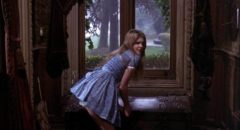
While they form one of the main building blocks of society, families are often mysterious when viewed from the outside, providing opportunities for mystery, suspense and horror since we began telling ourselves stories. Outsiders who penetrate the strange membrane between community and family may be faced with codes and rituals which can turn dangerous … as in four recently viewed movies: Curtis Harrington’s Night Tide (1961) and Games (1967), Freddie Francis’ Mumsy, Nanny, Sonny & Girly (1970) and Ted Post’s The Baby (1973).








